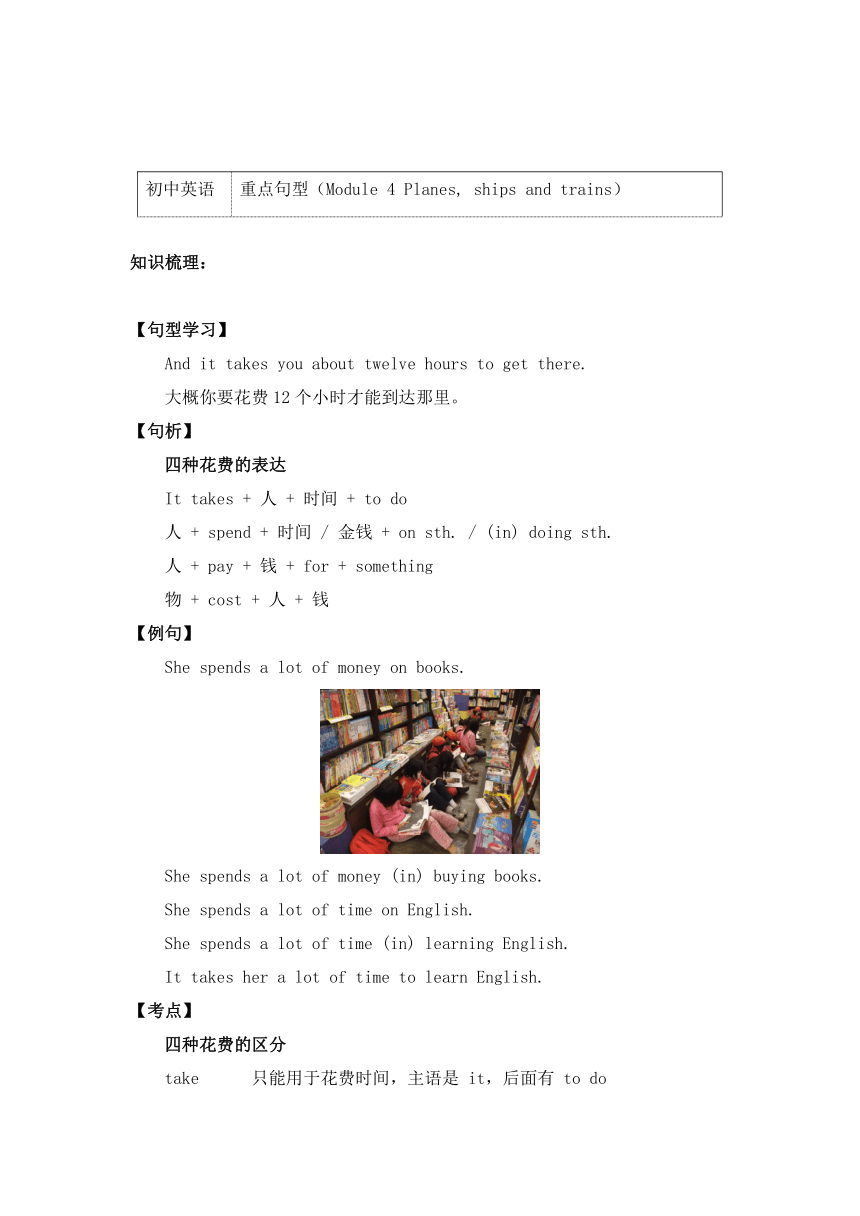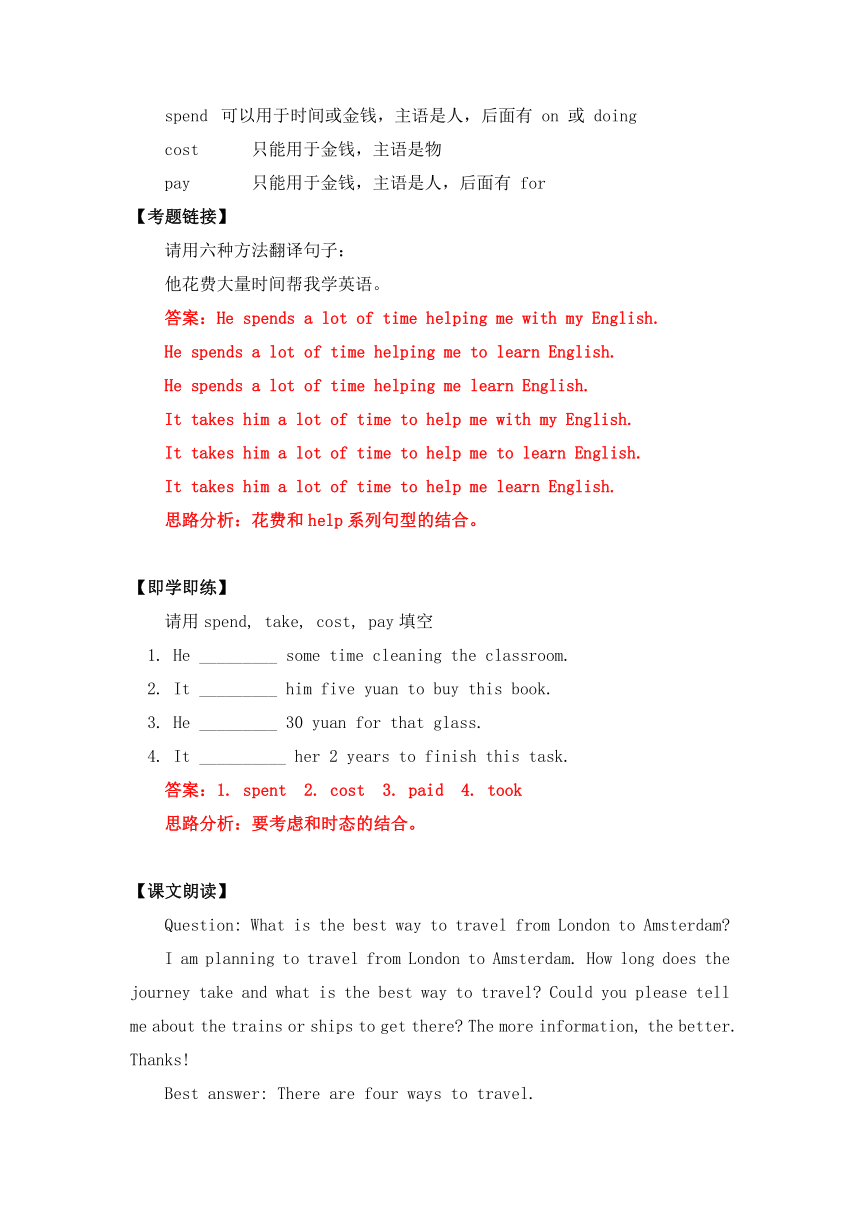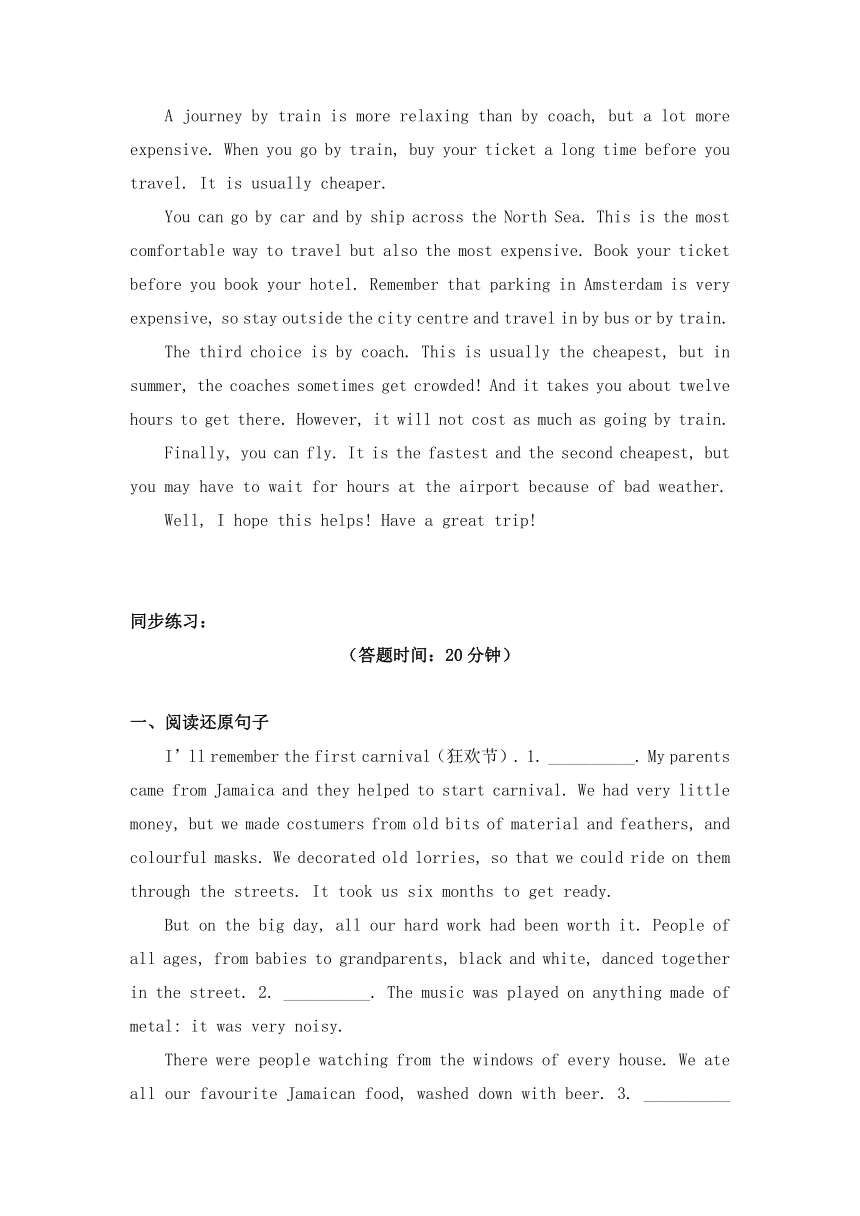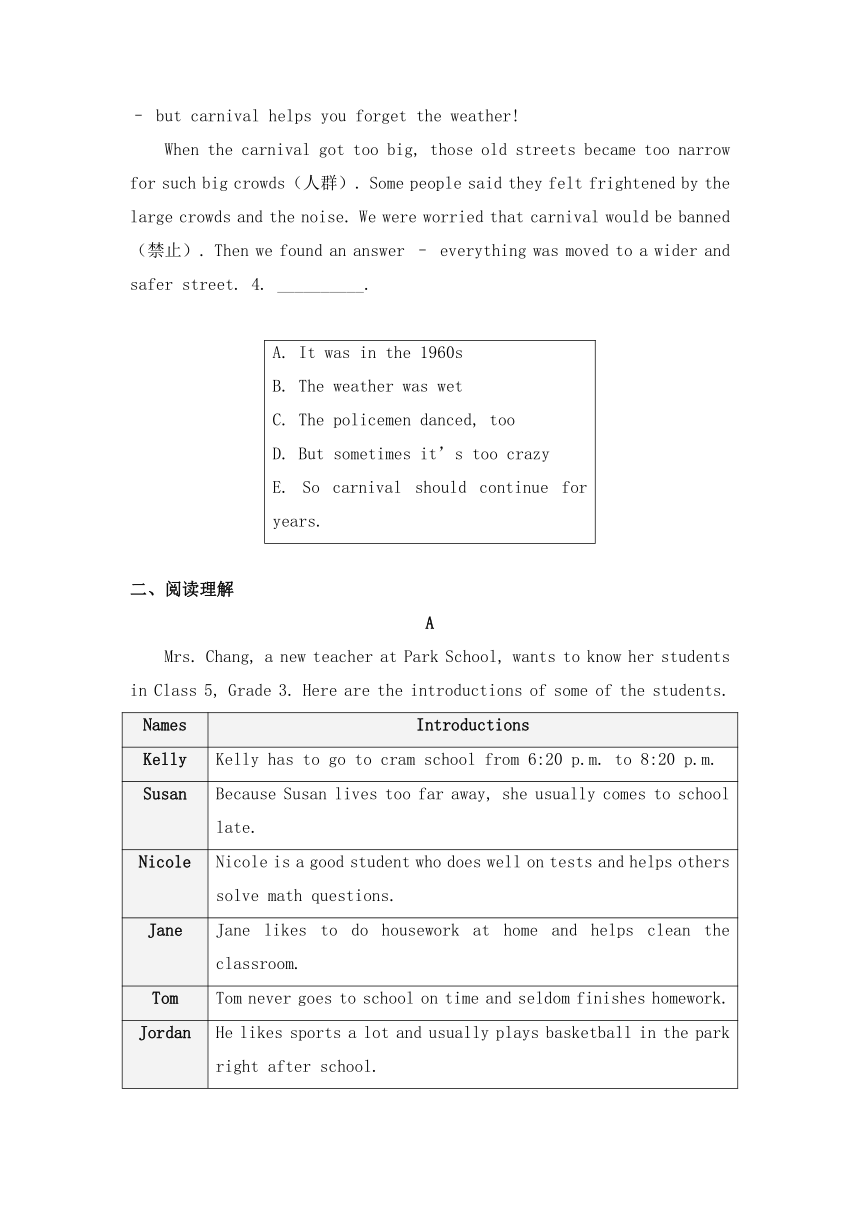外研版(三起)英语八年级上册 Module 4 Planes, ships and trains 重点句型 导学案 (含答案)
文档属性
| 名称 | 外研版(三起)英语八年级上册 Module 4 Planes, ships and trains 重点句型 导学案 (含答案) |

|
|
| 格式 | doc | ||
| 文件大小 | 836.9KB | ||
| 资源类型 | 教案 | ||
| 版本资源 | 外研版 | ||
| 科目 | 英语 | ||
| 更新时间 | 2020-09-17 13:50:28 | ||
图片预览




文档简介
初中英语 重点句型(Module 4 Planes, ships and trains)
知识梳理:
【句型学习】
And it takes you about twelve hours to get there.
大概你要花费12个小时才能到达那里。
【句析】
四种花费的表达
It takes + 人 + 时间 + to do
人 + spend + 时间 / 金钱 + on sth. / (in) doing sth.
人 + pay + 钱 + for + something
物 + cost + 人 + 钱
【例句】
She spends a lot of money on books.
She spends a lot of money (in) buying books.
She spends a lot of time on English.
She spends a lot of time (in) learning English.
It takes her a lot of time to learn English.
【考点】
四种花费的区分
take 只能用于花费时间,主语是 it,后面有 to do
spend 可以用于时间或金钱,主语是人,后面有 on 或 doing
cost 只能用于金钱,主语是物
pay 只能用于金钱,主语是人,后面有 for
【考题链接】
请用六种方法翻译句子:
他花费大量时间帮我学英语。
答案:He spends a lot of time helping me with my English.
He spends a lot of time helping me to learn English.
He spends a lot of time helping me learn English.
It takes him a lot of time to help me with my English.
It takes him a lot of time to help me to learn English.
It takes him a lot of time to help me learn English.
思路分析:花费和help系列句型的结合。
【即学即练】
请用spend, take, cost, pay填空
1. He _________ some time cleaning the classroom.
2. It _________ him five yuan to buy this book.
3. He _________ 30 yuan for that glass.
4. It __________ her 2 years to finish this task.
答案:1. spent 2. cost 3. paid 4. took
思路分析:要考虑和时态的结合。
【课文朗读】
Question: What is the best way to travel from London to Amsterdam?
I am planning to travel from London to Amsterdam. How long does the journey take and what is the best way to travel? Could you please tell me about the trains or ships to get there? The more information, the better. Thanks!
Best answer: There are four ways to travel.
A journey by train is more relaxing than by coach, but a lot more expensive. When you go by train, buy your ticket a long time before you travel. It is usually cheaper.
You can go by car and by ship across the North Sea. This is the most comfortable way to travel but also the most expensive. Book your ticket before you book your hotel. Remember that parking in Amsterdam is very expensive, so stay outside the city centre and travel in by bus or by train.
The third choice is by coach. This is usually the cheapest, but in summer, the coaches sometimes get crowded! And it takes you about twelve hours to get there. However, it will not cost as much as going by train.
Finally, you can fly. It is the fastest and the second cheapest, but you may have to wait for hours at the airport because of bad weather.
Well, I hope this helps! Have a great trip!
同步练习:
(答题时间:20分钟)
一、阅读还原句子
I’ll remember the first carnival(狂欢节). 1. __________. My parents came from Jamaica and they helped to start carnival. We had very little money, but we made costumers from old bits of material and feathers, and colourful masks. We decorated old lorries, so that we could ride on them through the streets. It took us six months to get ready.
But on the big day, all our hard work had been worth it. People of all ages, from babies to grandparents, black and white, danced together in the street. 2. __________. The music was played on anything made of metal: it was very noisy.
There were people watching from the windows of every house. We ate all our favourite Jamaican food, washed down with beer. 3. __________– but carnival helps you forget the weather!
When the carnival got too big, those old streets became too narrow for such big crowds(人群). Some people said they felt frightened by the large crowds and the noise. We were worried that carnival would be banned(禁止). Then we found an answer – everything was moved to a wider and safer street. 4. __________.
A. It was in the 1960s B. The weather was wet
C. The policemen danced, too
D. But sometimes it’s too crazy
E. So carnival should continue for years.
二、阅读理解
A
Mrs. Chang, a new teacher at Park School, wants to know her students in Class 5, Grade 3. Here are the introductions of some of the students.
Names Introductions
Kelly Kelly has to go to cram school from 6:20 p.m. to 8:20 p.m.
Susan Because Susan lives too far away, she usually comes to school late.
Nicole Nicole is a good student who does well on tests and helps others solve math questions.
Jane Jane likes to do housework at home and helps clean the classroom.
Tom Tom never goes to school on time and seldom finishes homework.
Jordan He likes sports a lot and usually plays basketball in the park right after school.
May May is friendly and likes to help people.
Mark Mark does well on tests, but he is shy and doesn’t like to help his classmates.
Carol She is Mrs. Chang’s best assistant that will do everything for her!
1. Who likes sports a lot?
A. Jordan. B. Susan. C. Carol. D. Jane.
2. What does Jane like to do?
A. To go to school late. B. To help clean the classroom.
C. To play basketball in the park. D. To help others solve math questions.
3. Who does well on tests?
A. Kelly and Tom. B. Nicole and Jordan.
C. May and Mark. D. Nicole and Mark.
B
For Sparky, school was all but impossible. He failed every subject in the eighth grade. He didn’t do much better in sports. Although he played for the school’s golf team, he lost the only important match of the season.
Sparky was a loser. He, his classmates…everyone knew it. Sparky never asked a classmate to go out in high school. He was too afraid of being refused.
However, one thing was important to Sparky – drawing. He was proud of his artwork. Of course, no one else appreciated it. In his senior year of high school, he sent some cartoons to the editors of the Yearbook. Although the cartoons were turned down, Sparky was so confident about his ability that he decided to become an artist.
After completing high school, he wrote a letter to Walt Disney Studios. He was told to send some samples of his artwork, and the subject for a cartoon was suggested. Sparky spent a great deal of time on it. Finally, the reply came from Disney Studios. He had been rejected(拒绝)once again. Another loss for the loser.
So Sparky decided to write his own autobiography(自传)in cartoons. He described his childhood – a little boy loser and underachiever. The cartoon character would soon become famous worldwide. For Sparky, the boy who had little success in school and whose work was rejected again and again was Charles Schulz. He created the Peanuts comic strip(连环漫画)and little cartoon character – Charlie Brown.
4. We can know that Sparky was ________ from the first paragraph.
A. a top student B. an artist C. a good player D. a failure
5. Sparky never asked a classmate to go out because he ______.
A. had never been invited B. didn’t like making friends
C. didn’t want to be refused D. was afraid of making mistakes
6. What’s Sparky’s success according to the passage?
A. He was good at golf playing.
B. He wrote a letter to Walt Disney Studios.
C. He drew some cartoons for the Yearbook.
D. His Peanuts comic strip became world famous.
三、阅读与表达
There are hundreds of funny and strange expressions in the English language. A lot of them include country names or nationalities. Take these examples:
The Dutch(丹麦人)are the target of most English expressions about nationalities. Why are there so many jokes about the Dutch in English? And what do these expressions mean? In the 17th and early 18th centuries, there were three wars between the British and the Dutch, and Dutch became a bad word. So double Dutch means something that has no meaning or is impossible to understand. A Dutch uncle is someone who gives much stronger advice than they need to. There are later expressions, which are funnier and kinder, like to go Dutch, which is nowadays a popular expression. It means to pay for your part of a bill. This often happens when a group of friends have a meal together, and each person pays for the food they ate. I’m a Dutchman is another commonly used expression. This means not being able to believe something.
An expression with a similar meaning to double Dutch is it’s all Greek to me, which means I don’t understand. The expression was made famous in Shakespeare’s play Julius Caesar although the expression is actually hundreds of years older.
If you take French leave, you are not present or leave somewhere without permission. For example, you could take French leave from a classroom or the place where you work. This expression is from the 18th century when French people left parties without saying goodbye to the host or hostess.
There are Chinese whispers, which mean confused(令人困惑的)messages. This describes the fact that a message can often change as it is passed from person to person. This expression comes from the First World War when foreigners were often confused by Chinese language.
Many people find English expressions confusing, but now that you know about some of them, you can easily have fun finding out many more funny English expressions.
1. Are there many jokes about the Dutch in English?
2. When did Dutch become a bad word?
3. What does “French leave” mean?
4. Which three expressions mentioned above have similar meanings?
5. What do the funny and strange expressions in the passage have in common?
答案:
一、1. A 2. C 3. B 4. E
二、1. A 2. B 3. D 4. D 5. C 6. D
三、1. Yes. / Yes, there are.
2. In the 17th and early 18th centuries.
3. It means you are not present or leave somewhere without permission.
4. Double Dutch, it’s all Greek to me and Chinese whispers.
5. They all include nationalities and have historic beginnings.
知识梳理:
【句型学习】
And it takes you about twelve hours to get there.
大概你要花费12个小时才能到达那里。
【句析】
四种花费的表达
It takes + 人 + 时间 + to do
人 + spend + 时间 / 金钱 + on sth. / (in) doing sth.
人 + pay + 钱 + for + something
物 + cost + 人 + 钱
【例句】
She spends a lot of money on books.
She spends a lot of money (in) buying books.
She spends a lot of time on English.
She spends a lot of time (in) learning English.
It takes her a lot of time to learn English.
【考点】
四种花费的区分
take 只能用于花费时间,主语是 it,后面有 to do
spend 可以用于时间或金钱,主语是人,后面有 on 或 doing
cost 只能用于金钱,主语是物
pay 只能用于金钱,主语是人,后面有 for
【考题链接】
请用六种方法翻译句子:
他花费大量时间帮我学英语。
答案:He spends a lot of time helping me with my English.
He spends a lot of time helping me to learn English.
He spends a lot of time helping me learn English.
It takes him a lot of time to help me with my English.
It takes him a lot of time to help me to learn English.
It takes him a lot of time to help me learn English.
思路分析:花费和help系列句型的结合。
【即学即练】
请用spend, take, cost, pay填空
1. He _________ some time cleaning the classroom.
2. It _________ him five yuan to buy this book.
3. He _________ 30 yuan for that glass.
4. It __________ her 2 years to finish this task.
答案:1. spent 2. cost 3. paid 4. took
思路分析:要考虑和时态的结合。
【课文朗读】
Question: What is the best way to travel from London to Amsterdam?
I am planning to travel from London to Amsterdam. How long does the journey take and what is the best way to travel? Could you please tell me about the trains or ships to get there? The more information, the better. Thanks!
Best answer: There are four ways to travel.
A journey by train is more relaxing than by coach, but a lot more expensive. When you go by train, buy your ticket a long time before you travel. It is usually cheaper.
You can go by car and by ship across the North Sea. This is the most comfortable way to travel but also the most expensive. Book your ticket before you book your hotel. Remember that parking in Amsterdam is very expensive, so stay outside the city centre and travel in by bus or by train.
The third choice is by coach. This is usually the cheapest, but in summer, the coaches sometimes get crowded! And it takes you about twelve hours to get there. However, it will not cost as much as going by train.
Finally, you can fly. It is the fastest and the second cheapest, but you may have to wait for hours at the airport because of bad weather.
Well, I hope this helps! Have a great trip!
同步练习:
(答题时间:20分钟)
一、阅读还原句子
I’ll remember the first carnival(狂欢节). 1. __________. My parents came from Jamaica and they helped to start carnival. We had very little money, but we made costumers from old bits of material and feathers, and colourful masks. We decorated old lorries, so that we could ride on them through the streets. It took us six months to get ready.
But on the big day, all our hard work had been worth it. People of all ages, from babies to grandparents, black and white, danced together in the street. 2. __________. The music was played on anything made of metal: it was very noisy.
There were people watching from the windows of every house. We ate all our favourite Jamaican food, washed down with beer. 3. __________– but carnival helps you forget the weather!
When the carnival got too big, those old streets became too narrow for such big crowds(人群). Some people said they felt frightened by the large crowds and the noise. We were worried that carnival would be banned(禁止). Then we found an answer – everything was moved to a wider and safer street. 4. __________.
A. It was in the 1960s B. The weather was wet
C. The policemen danced, too
D. But sometimes it’s too crazy
E. So carnival should continue for years.
二、阅读理解
A
Mrs. Chang, a new teacher at Park School, wants to know her students in Class 5, Grade 3. Here are the introductions of some of the students.
Names Introductions
Kelly Kelly has to go to cram school from 6:20 p.m. to 8:20 p.m.
Susan Because Susan lives too far away, she usually comes to school late.
Nicole Nicole is a good student who does well on tests and helps others solve math questions.
Jane Jane likes to do housework at home and helps clean the classroom.
Tom Tom never goes to school on time and seldom finishes homework.
Jordan He likes sports a lot and usually plays basketball in the park right after school.
May May is friendly and likes to help people.
Mark Mark does well on tests, but he is shy and doesn’t like to help his classmates.
Carol She is Mrs. Chang’s best assistant that will do everything for her!
1. Who likes sports a lot?
A. Jordan. B. Susan. C. Carol. D. Jane.
2. What does Jane like to do?
A. To go to school late. B. To help clean the classroom.
C. To play basketball in the park. D. To help others solve math questions.
3. Who does well on tests?
A. Kelly and Tom. B. Nicole and Jordan.
C. May and Mark. D. Nicole and Mark.
B
For Sparky, school was all but impossible. He failed every subject in the eighth grade. He didn’t do much better in sports. Although he played for the school’s golf team, he lost the only important match of the season.
Sparky was a loser. He, his classmates…everyone knew it. Sparky never asked a classmate to go out in high school. He was too afraid of being refused.
However, one thing was important to Sparky – drawing. He was proud of his artwork. Of course, no one else appreciated it. In his senior year of high school, he sent some cartoons to the editors of the Yearbook. Although the cartoons were turned down, Sparky was so confident about his ability that he decided to become an artist.
After completing high school, he wrote a letter to Walt Disney Studios. He was told to send some samples of his artwork, and the subject for a cartoon was suggested. Sparky spent a great deal of time on it. Finally, the reply came from Disney Studios. He had been rejected(拒绝)once again. Another loss for the loser.
So Sparky decided to write his own autobiography(自传)in cartoons. He described his childhood – a little boy loser and underachiever. The cartoon character would soon become famous worldwide. For Sparky, the boy who had little success in school and whose work was rejected again and again was Charles Schulz. He created the Peanuts comic strip(连环漫画)and little cartoon character – Charlie Brown.
4. We can know that Sparky was ________ from the first paragraph.
A. a top student B. an artist C. a good player D. a failure
5. Sparky never asked a classmate to go out because he ______.
A. had never been invited B. didn’t like making friends
C. didn’t want to be refused D. was afraid of making mistakes
6. What’s Sparky’s success according to the passage?
A. He was good at golf playing.
B. He wrote a letter to Walt Disney Studios.
C. He drew some cartoons for the Yearbook.
D. His Peanuts comic strip became world famous.
三、阅读与表达
There are hundreds of funny and strange expressions in the English language. A lot of them include country names or nationalities. Take these examples:
The Dutch(丹麦人)are the target of most English expressions about nationalities. Why are there so many jokes about the Dutch in English? And what do these expressions mean? In the 17th and early 18th centuries, there were three wars between the British and the Dutch, and Dutch became a bad word. So double Dutch means something that has no meaning or is impossible to understand. A Dutch uncle is someone who gives much stronger advice than they need to. There are later expressions, which are funnier and kinder, like to go Dutch, which is nowadays a popular expression. It means to pay for your part of a bill. This often happens when a group of friends have a meal together, and each person pays for the food they ate. I’m a Dutchman is another commonly used expression. This means not being able to believe something.
An expression with a similar meaning to double Dutch is it’s all Greek to me, which means I don’t understand. The expression was made famous in Shakespeare’s play Julius Caesar although the expression is actually hundreds of years older.
If you take French leave, you are not present or leave somewhere without permission. For example, you could take French leave from a classroom or the place where you work. This expression is from the 18th century when French people left parties without saying goodbye to the host or hostess.
There are Chinese whispers, which mean confused(令人困惑的)messages. This describes the fact that a message can often change as it is passed from person to person. This expression comes from the First World War when foreigners were often confused by Chinese language.
Many people find English expressions confusing, but now that you know about some of them, you can easily have fun finding out many more funny English expressions.
1. Are there many jokes about the Dutch in English?
2. When did Dutch become a bad word?
3. What does “French leave” mean?
4. Which three expressions mentioned above have similar meanings?
5. What do the funny and strange expressions in the passage have in common?
答案:
一、1. A 2. C 3. B 4. E
二、1. A 2. B 3. D 4. D 5. C 6. D
三、1. Yes. / Yes, there are.
2. In the 17th and early 18th centuries.
3. It means you are not present or leave somewhere without permission.
4. Double Dutch, it’s all Greek to me and Chinese whispers.
5. They all include nationalities and have historic beginnings.
同课章节目录
- Module 1 How to learn English
- Unit 1 Let's try to speak English as much as possi
- Unit 2 You should smile at her.
- Unit 3 Language in use .
- Module 2 My home town and my country
- Unit 1 It's taller than many other buildings.
- Unit 2 Cambridge is a beautiful city in the east o
- Unit 3 Language in use .
- Module 3 Sports.
- Unit 1 Nothing is more exciting than playing tenni
- Unit 2 This year we training more carefully.
- Unit 3 Language in use .
- Module 4 Planes, ships and trains .
- Unit 1 He lives the farthest from school.
- Unit 2 What is the best way to travel.
- Unit 3 Language in use .
- Module 5 Lao She Teahouse.
- Unit 1 I wanted to see the Beijing Opera.
- Unit 2 It descibes the changes in Chinese society.
- Unit 3 Language in use .
- Module 6 Animals in danger.
- Unit 1 It allows people to get closer to them .
- Unit 2 The WWF is working hard to save them all.
- Unit 3 Language in use .
- Revision module A
- Module 7 A famous story
- Unit 1 Alice was sitting with her sister by the ri
- Unit 2 She was thinking about her cat.
- Unit 3 Language in use .
- Module 8 Accidents
- Unit 1 While the car were changing to red, a car s
- Unit 2 I was trying to pick it up when it bite me
- Unit 3 Language in use .
- Module 9 Population
- Unit 1 The population of China is about 1.37 billi
- Unit 2 Arnwick was a city with 200,000 people.
- Unit 3 Language in use .
- Module 10 The weathe
- Unit 1 It might snow.
- Unit 2 The weather is fine all year round.
- Unit 3 Language in use .
- Module 11 Way of life
- Unit 1 In China ,we open a gift later.
- Unit 2 In England, you usually drink tea with milk
- Unit 3 Language in use .
- Module 12 Help
- Unit 1 What should we do before help arrives?
- Unit 2 Stay away from windows and heavy furniture.
- Unit 3 Language in use .
- Revision module B
